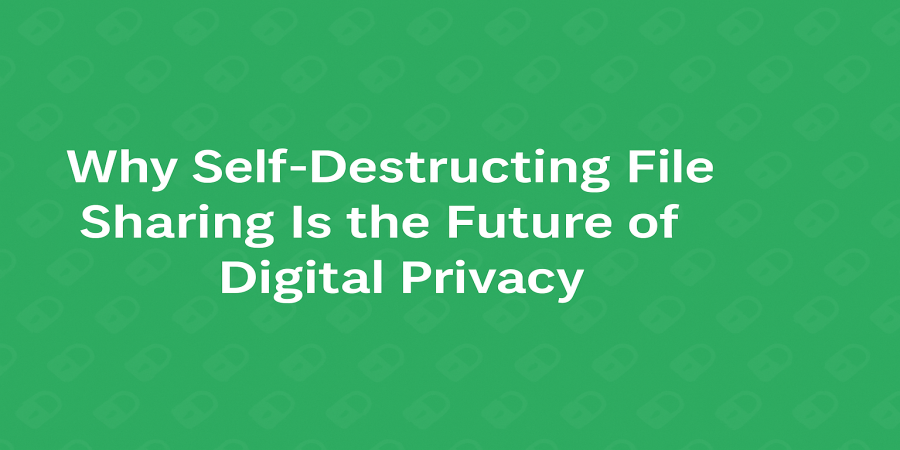

Why Self-Destructing File Sharing Is the Future of Digital Privacy
In an era dominated by data, our personal and professional lives are increasingly digitized. From sensitive work documents to private conversations, the internet has become a vast archive of our most valuable information. But as our reliance on digital communication grows, so too does the threat to our privacy. With rising cyber threats, overexposed cloud storage systems, and careless data sharing practices, safeguarding our digital footprints has never been more critical.
Enter self-destructing file sharing: a revolutionary approach to digital privacy that could very well define the future of secure communication. Platforms like TransFilex are leading the way by offering tools that allow users to share files that automatically delete after being accessed or after a certain period of time. This seemingly simple feature solves a complex problem — keeping our private files truly private.
The Growing Threat to Digital Privacy
Let’s start by understanding the current landscape. Cybercrime is booming. According to a 2023 report by Cybersecurity Ventures, cybercrime is projected to cost the world $10.5 trillion annually by 2025. Data breaches, ransomware attacks, and phishing scams have become everyday news. No individual or organization is immune.
Consider the infamous Equifax data breach in 2017, where sensitive information of 147 million people was exposed. Or the more recent MOVEit file transfer software breach in 2023 that impacted hundreds of organizations globally, exposing sensitive internal documents. These incidents aren't just corporate failures; they're wake-up calls for all of us.
Beyond hackers, there’s another enemy: overexposure. Many people still use public cloud storage services without fully understanding how long their data is stored or who can access it. Files shared via email, cloud links, or messaging apps can linger indefinitely. A resume sent to a recruiter or a confidential agreement sent to a business partner can live on long after the intended purpose has passed.
Even with good intentions, human error is a major factor. People forget to revoke access to shared links, forward sensitive files without encryption, or store critical information in unprotected folders. These small mistakes can lead to big consequences.
The Problem with Traditional File Sharing
Traditional file sharing methods are inherently flawed when it comes to privacy. Email attachments, cloud storage links, and even password-protected files come with significant risks:
-
Lack of expiration: Most shared files remain accessible forever unless manually deleted.
-
Poor tracking: Senders often have no idea who has opened, forwarded, or saved the file.
-
Access vulnerabilities: Links can be copied, hacked, or accidentally exposed.
-
No recall capability: Once it’s sent, it’s out of your hands.
These issues are amplified in high-stakes environments like legal services, healthcare, government, or finance where compliance and confidentiality are paramount.
The Rise of Self-Destructing Files
Self-destructing file sharing is a privacy-first innovation that flips the traditional model. Instead of focusing on storing and archiving, it focuses on limited, secure access. Here’s how it works:
-
Files are uploaded to a secure server.
-
The sender sets an expiration condition (e.g., one-time view or deletion after 24 hours).
-
A unique, encrypted link is generated and shared.
-
After the recipient accesses the file or the timer expires, the file is permanently deleted.
No lingering files. No backdoors. No digital residue.
This approach has gained traction in privacy-conscious communities, but with tools like TransFilex, it’s now available to anyone. Whether you're a lawyer sending a draft contract, a business owner sharing credentials, or a freelancer submitting client work, self-destructing files offer peace of mind.
Real-World Use Cases
1. Legal & Financial Services
Firms can send confidential agreements, tax records, or personal documents to clients knowing they’ll disappear after use, reducing the risk of data leakage or regulatory violations.
2. Human Resources
Share onboarding documents, IDs, or sensitive internal communication without worrying about them floating around inboxes forever.
3. Freelancers & Agencies
Deliver creative work, source files, or password sheets to clients that are meant for one-time use.
4. Healthcare Professionals
Send lab results, prescriptions, or patient data in compliance with data privacy laws like HIPAA.
5. Personal Use
Share private photos, sensitive information, or one-time downloads (e.g., resumes, documents) with full control over their lifecycle.
How TransFilex Is Leading the Charge
TransFilex is a next-gen file sharing platform designed with privacy at its core. Unlike conventional services that prioritize storage, TransFilex is built around ephemeral delivery — meaning your file exists only as long as it’s needed.
Key Features:
-
Self-destruct after view or time
Choose between one-time access or time-based expiration (e.g., 1 hour, 1 day, 7 days). -
Military-grade encryption
Files are encrypted in transit and at rest, ensuring no one can snoop on your data. -
No sign-up required
Quick and anonymous usage with no personal information required. -
Link analytics (optional)
Know when and how many times your file was accessed, and get notified. -
Ad-supported or premium plans
Choose between a free, ad-supported version or go premium for added features and no ads.
The Psychology of Privacy: Why It Matters
Data is the new currency, and companies are hungry for it. But for individuals, privacy is deeply personal. It’s about autonomy, safety, and trust.
When people know their shared files will vanish after delivery, they feel more secure and confident. This psychological assurance is powerful — especially when dealing with sensitive conversations or valuable IP (intellectual property).
Challenges and Myths
There are some common concerns about self-destructing file sharing:
-
"What if the recipient needs it again?"
You can always re-send the file with a new link. That’s the point — control. -
"Can’t someone just take a screenshot or save it anyway?"
Yes, but that's a limitation of all digital sharing. The goal here is to minimize access and reduce the chance of unintended spread. -
"It seems too simple to be safe."
Simplicity is intentional. Platforms like TransFilex use advanced encryption behind the scenes to offer military-grade security without complexity.
What the Future Holds
The future of digital privacy is ephemeral. Just like messages that disappear on platforms like Signal or Snapchat, self-destructing files will become a standard part of communication workflows across industries.
As data privacy laws tighten and consumers become more aware of digital risks, tools that enable temporary, secure sharing will move from niche to necessary. We expect to see:
-
Integration with business tools like Slack, email clients, and project management systems.
-
Wider adoption in sectors like law, health, education, and journalism.
-
Advancements in access control (e.g., biometric unlock, region locks).
-
AI-powered leak detection and smart expiration settings.
TransFilex is building for this future — a world where you control your data, not the other way around.
Final Thoughts
The internet never forgets — and that’s a problem. But with self-destructing file sharing, you can choose what’s remembered and what vanishes.
TransFilex isn’t just another file sharing tool. It’s a digital privacy ally for a generation that understands the value of disappearing data. As we move forward in a data-driven world, having tools that let us protect our information — and delete it when necessary — will no longer be optional. It’ll be essential.
Start sharing smarter. Start sharing safer. Try TransFilex today.
Popular articles

Apr 06, 2025 08:29 AM

Apr 06, 2025 08:26 AM

Apr 06, 2025 08:22 AM
Categories
Comments (0)